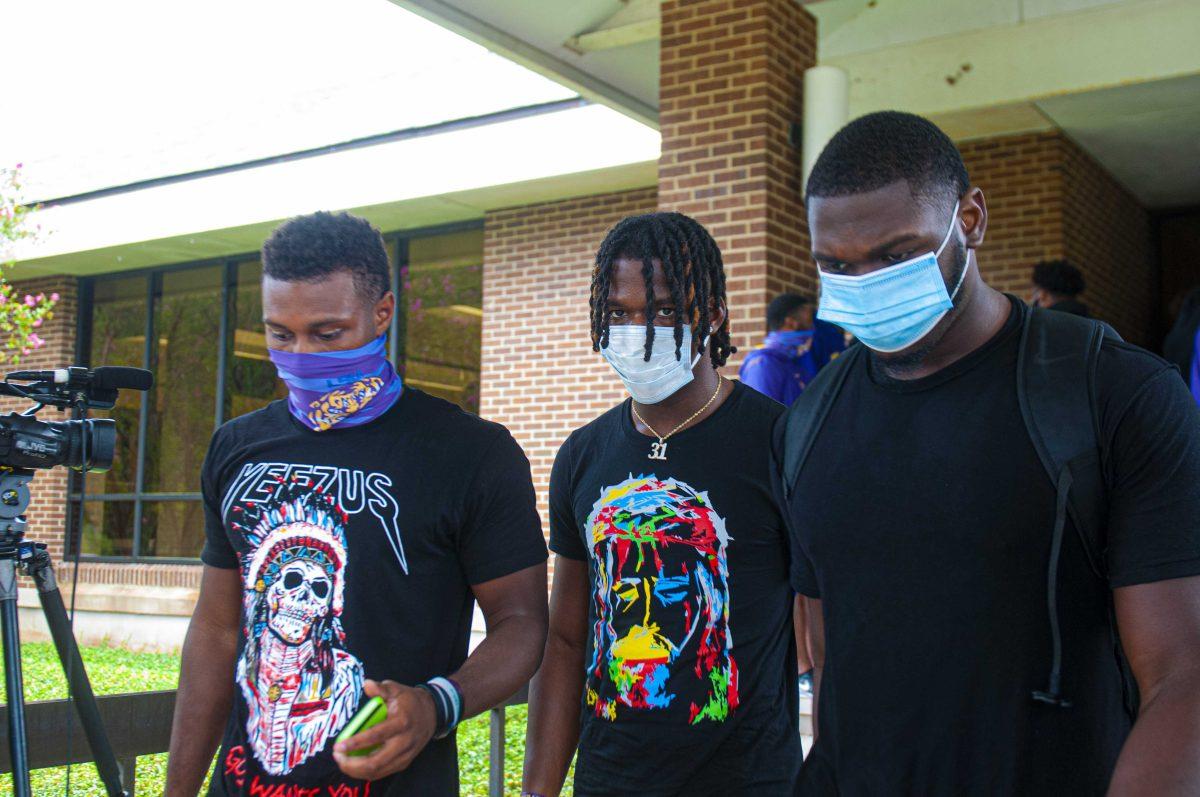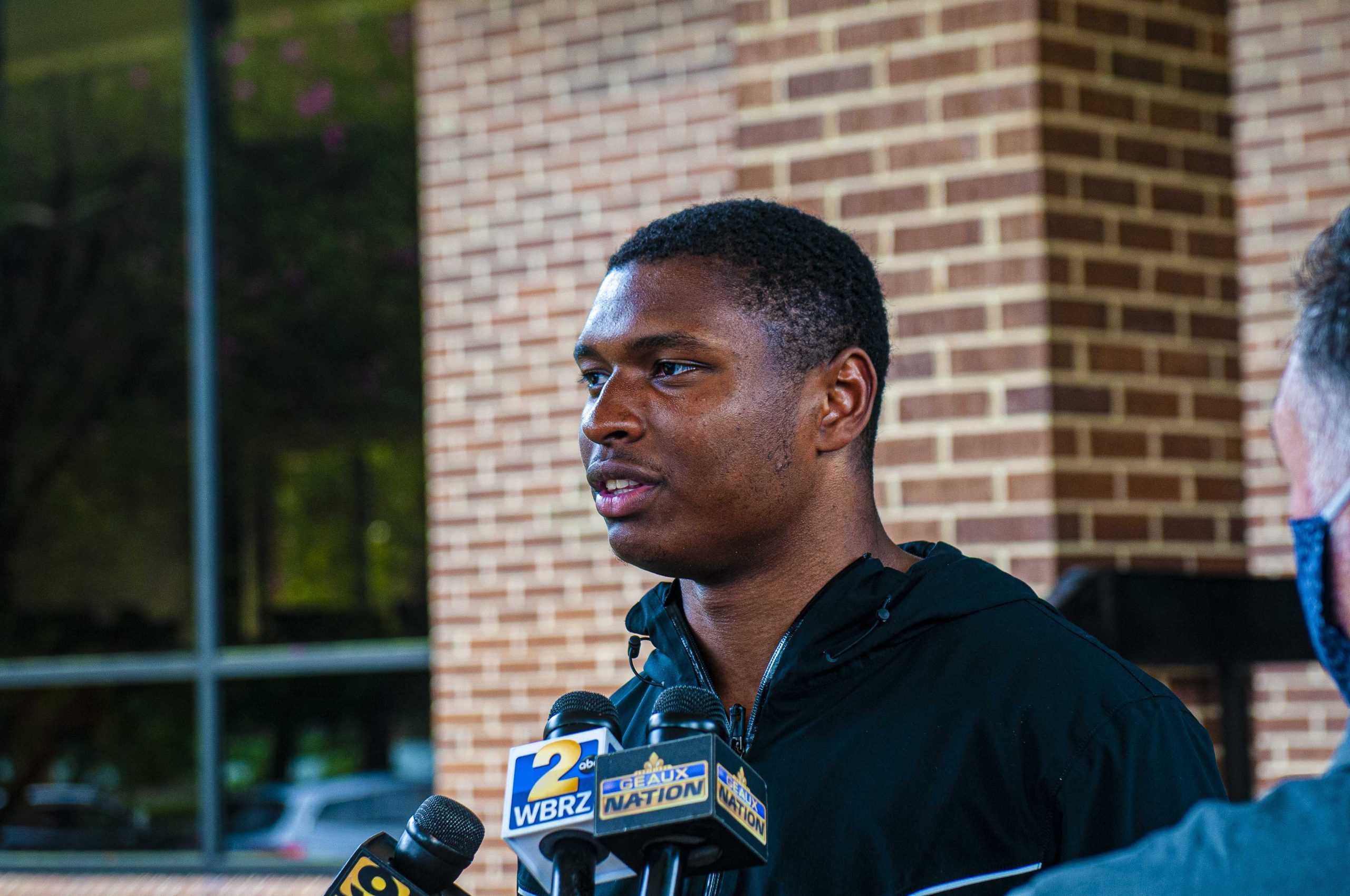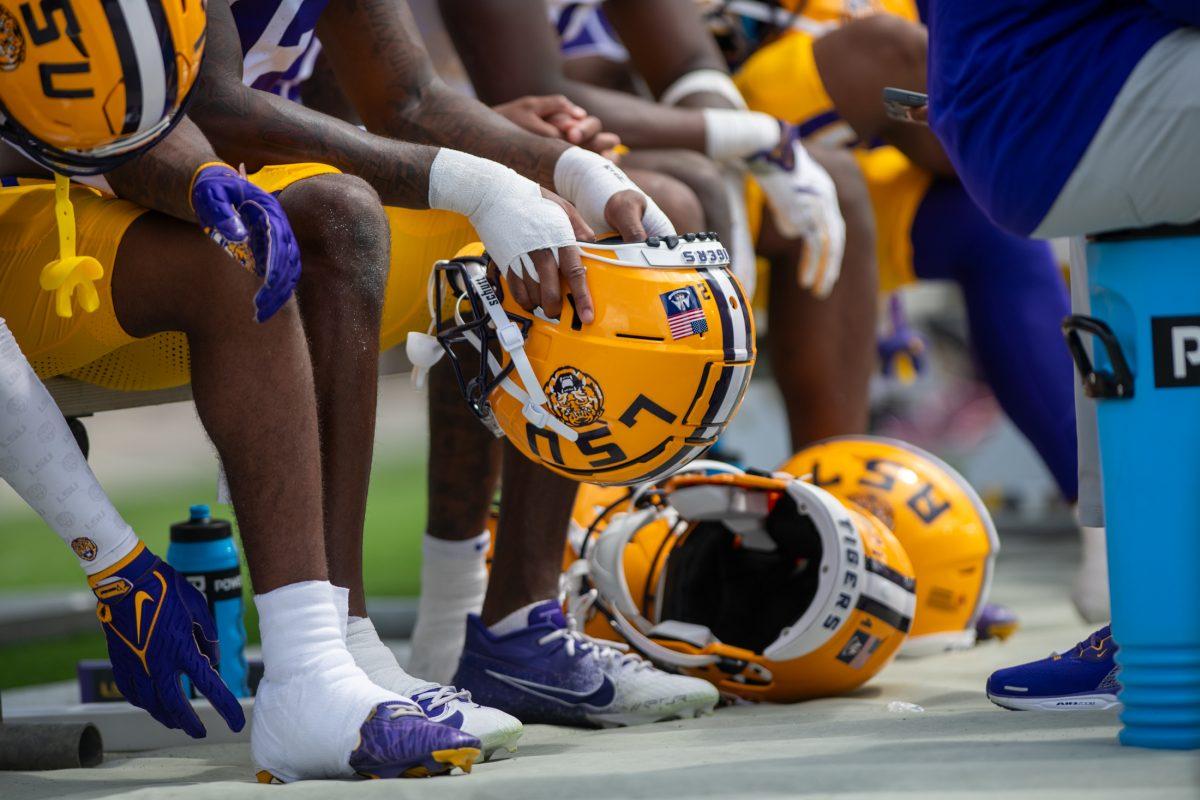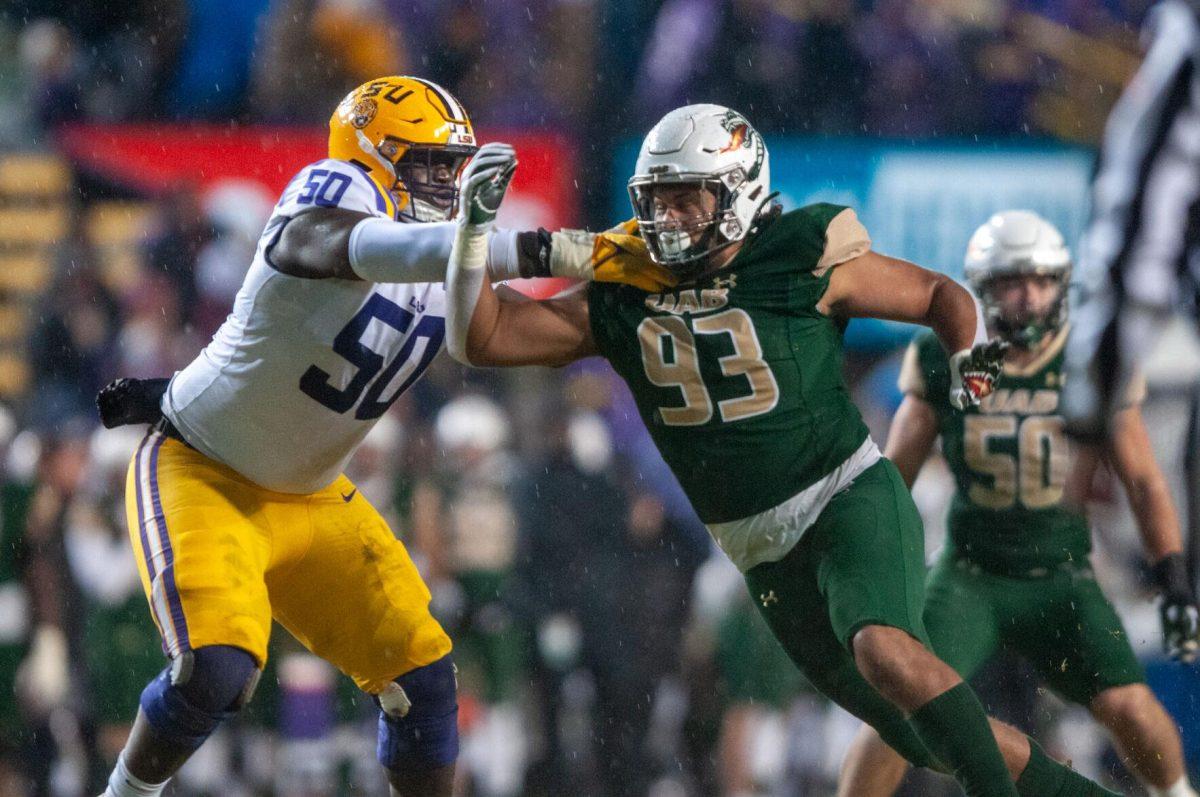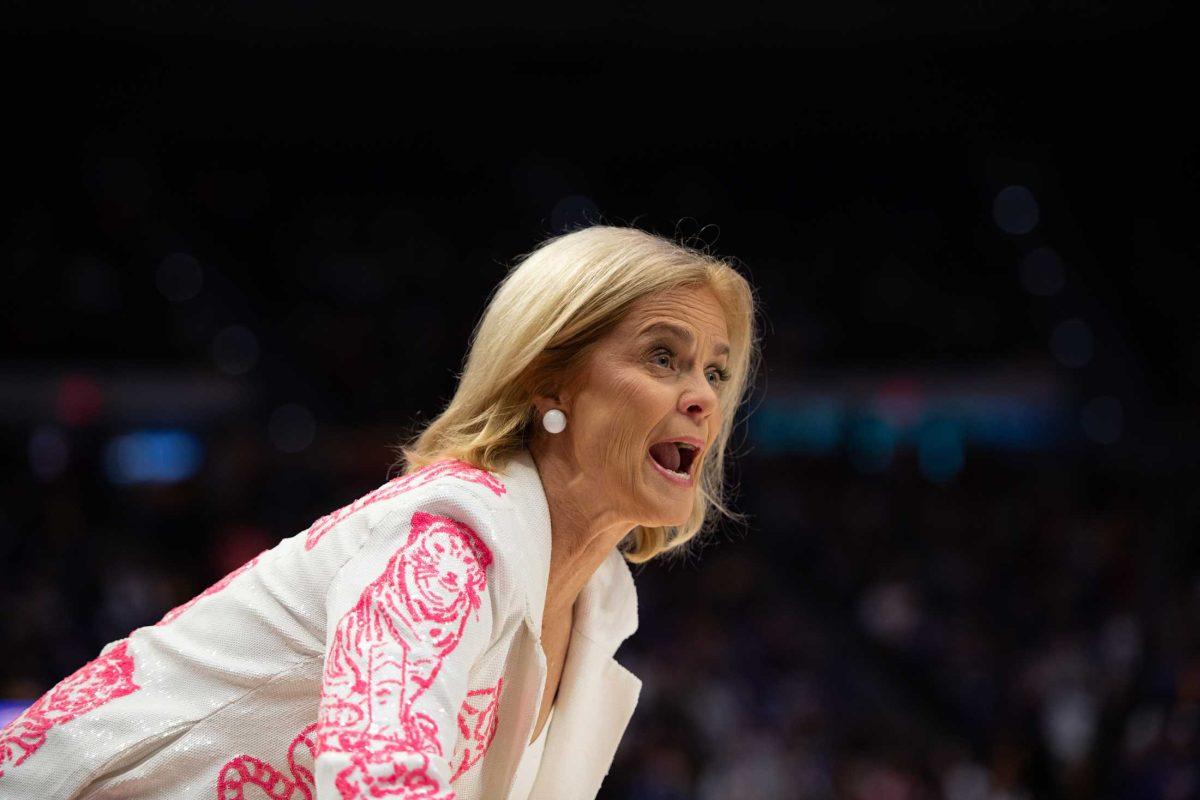Long after all his teammates had filed out the University Administration building, JaCoby Stevens stood outside on the steps, fielding questions from reporters.
“We need to have this conversation of social injustice,” he said. “We need to have this conversation and admit there is racism out there. If we have those types of conversations as a people…and actually admit it, I think that we can make a lot of improvements and take a lot of steps forward.”
The last to leave the team’s march against racial inequality last Friday, Stevens was also the first to arrive, when he and linebacker Andre Anthony orchestrated a strike on that day’s practice. The players met at Tiger Stadium in the afternoon, to the surprise of coach Ed Orgeron, and stood resolute for a photo-op. They then marched across campus, fists raised high, to the University president’s office.
After meeting with Interim President Tom Galligan, Athletic Director Scott Woodward and Orgeron, Stevens spoke to the LSU community on behalf of the players.
“I hope it encourages people to bring up a conversation,” he said. “We had the head coach, the AD and the president of the school here, so I think in our social world here at LSU and in Baton Rouge, I think we did a really good job.”
At the meeting, the players told the University leaders about their encounters with racism. Remove the pads, the helmets or the 100,000 screaming fans, Stevens said, and these players are ordinary Black men, marching through a world fraught with racism, on a wet, rainy Friday afternoon.
“I understand their feelings,” Orgeron said. “We’re like family. There’s a lot of hurt going on. I want to let them know that I fully support their decision.”
“It wasn’t a question if Coach O was going to listen,” Stevens said. “He always does. I think he was really receptive to it. He came, and he really supported us.”
“I need to know more about them,” Orgeron said. “I don’t go through the same things they go through. I don’t have the same feelings that they have. They face different things that I heard about today that I never knew before, so obviously, I want to hear them out. I want to be there for them, and I want to support them 110%.”
“Thank you to our LSU football student-athletes for speaking up,” Galligan wrote on Twitter after meeting with the team. “We support you, we stand with you against racism and inequality, and we know actions will always speak louder than words.”
Almost a week before the team’s protest, a police officer in Kenosha, WI shot Jacob Blake, a 29-year-old Black father, seven times in the back, leaving him paralyzed from the waist down. The officers were responding to a domestic incident on Aug. 23 that Blake was attempting to de-escalate, according to his attorney.
When the police arrived, Blake began walking to his car where his three sons were waiting for him. Police first tried to stop him with a taser before one officer fired seven shots into his back, Wisconsin state investigators say. The officer who shot Blake, Rusten Sheskey, was placed on administrative leave, and an investigation into the shooting went to the Wisconsin Department of Justice. A civil rights probe was also launched.
Nightly protests ensued in Kenosha following the shooting. On Tuesday night, 17-year-old Kyle Rittenhouse shot and killed two protesters and wounded a third. He is facing charges of homicide and felony charges of attempted homicide.
LSU’s protest was part of a larger movement of athletes protesting racial inequality in the week after Blake’s shooting. The Milwaukee Bucks announced a strike of their playoff game on Wednesday night, forcing the NBA to postpone the playoffs. Players across the WNBA, NHL, MLB and MLS followed suit and chose not to practice or play games in protest.
The NBA players agreed to resume playoffs on Saturday after the league agreed to a three-point plan to confront systemic racism.
One: The league will create a social justice coalition of players, coaches and governors that will work to “increase access to voting, promote civic engagement and advocate for meaningful police and criminal justice reform.”
Two: Every NBA arena that is owned by a team will be converted into a polling place for the November election, allowing ample space for residents to vote safely.
Three: The NBA will work with its broadcast partners to open advertising slots during playoff games “dedicated to promoting greater civic engagement in national and local elections and raising awareness around voter access and opportunity.”
The Oklahoma Sooners also marched across their campus in Norman on Friday, dressed in all black. Head coach Lincoln Riley stood at the front of the march, joining senior safety Chanse Sylvie, who recently drafted his own plans for police reform and discussed them with lawmakers, according to The Athletic.
On Monday, University of Alabama football players and coaches will walk from their practice facility to the Foster Auditorium, where Gov. George Wallace infamously stood in 1963, attempting to block the university from integrating.
Missouri football also canceled its practice on Friday and held a meeting instead. Missouri football players went on strike in 2015, declining to participate in all football-related activities
until the university’s president, Tim Wolfe, resigned. Wolfe, under fire for his handling of incidents of racism on campus, resigned two days after the players’ strike.
Ole Miss football also protested on Friday in lieu of practice. On the 65th anniversary of Emmitt Till’s murder, the players marched from campus to downtown Oxford at the site of a Confederate monument. The team stood around the statue in front of the Lafayette County Courthouse, chanting, “No justice, no peace” and “Hands up, don’t shoot.”
Mississippi State football held a similar demonstration. In June, star running back Kylin Hill announced that he would not play this season unless the Mississippi state legislature voted to remove the Confederate emblem off its state flag. By the end of the month, Gov. Tate Reeves signed a bill into law that removed the stars and bars from the flag.
Over the summer, the LSU Board of Supervisors voted to remove Troy H. Middleton’s name from the library in the heart of campus due to his vocal support of segregation while president of the University. The University also announced that it will form a new committee that will work to rename other buildings on campus named after slaveholders, Confederates, segregationists and racists. The College of Humanities and Social Sciences announced plans to promote its African and African American Studies program to department status.
On the steps outside the president’s office, Stevens said the actions of athletes across the country inspired the march across the University. Previous generations of his family fought for civil rights, Stevens said, so he felt he had no choice but to protest.
“I really don’t have a choice because of the color of my skin,” he said, “but I have so many great people in my family who fought for civil rights, and I feel like I need to take on that burden.”
“I think we really needed this.”
‘We really needed this’: LSU football players join movement of athletes protesting racial inequality
By Reed Darcey
August 29, 2020
LSU football players leave LSU President office on Friday, Aug. 28, 2020 after holding protest.
More to Discover



